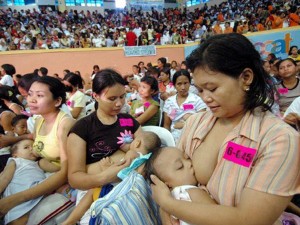UN: Breast-feeding up in PH but more needs to be done
MANILA, Philippines—Here’s good news for advocates of breast-feeding in the country.
The breast-feeding rate among mothers in the Philippines has significantly increased, according to three major United Nations agencies.
The International Labor Organization (ILO), United Nations Children’s Fund (Unicef) and World Health Organization (WHO) cited recent figures released by the Food and Nutrition Research Institute that showed breast-feeding rates had risen from 36 percent in 2008 to 47 percent in 2011.
The data also showed that the initiation of breast-feeding within one hour of delivery rose from 32 percent in 2008 to 52 percent in 2011.
Right to breast-feed
Article continues after this advertisementBut while the international organizations hailed the Philippine government for this development, the ILO stressed that the challenge of continuing breast-feeding when a mother returned to work remained as many working women still faced the risk of lost income after giving birth.
Article continues after this advertisement“Working women often feel the pressure to immediately report back to work and give up breast-feeding for fear of losing their jobs or returning to work at lower pay or positions,” said director Lawrence Jeff Johnson of the ILO Country Office for the Philippines.
The ILO has been working to encourage employers to support their women employees’ right to breast-feed during work hours.
“Workplaces which provide space and time for mothers to continue breast-feeding profit in terms of increased productivity, reduced parental absence, lower health care costs, higher rate of return to work, increased staff loyalty and reduced training budget,” Johnson said in a statement.
Unicef, on the other hand, hailed the strong legislative and policy framework in the Philippines, which is recognized “as one of the best in the world as it protects every Filipino mother’s right to breast-feed.”
Successful Milk Code
Unicef representative Tomoo Hozumi cited the Milk Code, or Executive Order No. 51, which ensures that breast-feeding is protected and women are given clear information on the benefits of breast-feeding without the undue influence of infant formula companies. The Milk Code was signed by President Corazon Aquino in 1986.
“The very substantial improvement in the exclusive breast-feeding rate that we are seeing today is a dividend of such efforts made by leaders and people in the Philippines over the last two decades. These laws are something which the whole nation should be proud of and continue to uphold,” Hozumi added.
Serious jeopardy
Breast-feeding advocates likewise hailed the increase of breast-feeding rates in the country, but expressed fear over the proposed amendment of the existing Milk Code.
“This bill, now pending in the House of Representatives, could seriously jeopardize the country’s increasing breast-feeding rates,” lawyer Jennifer Joy C. Ong, a government employee and a working mother, explained. Ong is behind the breast-feeding and parenting blog, Chronicles of a Nursing Mom, which has gained a following among Filipino mothers on the Internet.
Ong explained that the “monster bill,” a term coined by breast-feeding advocates, will allow health and nutritional claims, among other proposed provisions detrimental to breast-feeding.
“These claims refer to those formula milk advertisements pertaining to ‘gifted’ children, +7 IQ points, etc. People do not see these ads anymore because they are prohibited under Section 16 of the Milk Code’s Revised IRR,” Ong explained.
She added: “Working mothers could be influenced by these unregulated milk advertisements, and may be discouraged from continuing exclusive breast-feeding beyond six months.”
International standards
The “monster bill,” according to Ong, also seeks to allow infant milk donations during disasters and emergencies.
“This move will go against established international standards that emphasize the promotion of breast-feeding in the aftermath of such calamities,” Ong said.
The ILO, Unicef and WHO likewise noted that there are still substantial disparities in exclusive breast-feeding rates within the Philippines.
They cited the data the recent Family Health Survey in 2011, which showed that exclusive breast-feeding rates in some areas of the country are as low as 27 percent.
